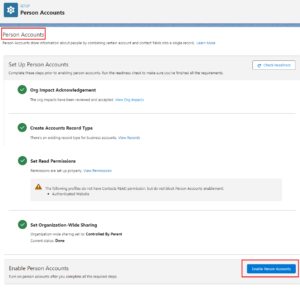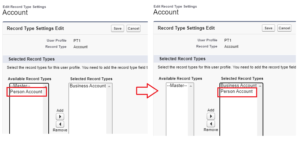Hello Trailblazers…
As you all know, Salesforce, as a versatile customer relationship management (CRM) platform, provides a variety of features to manage different- different business needs. One such feature is the “Person Account,” designed for businesses that interact directly with individual consumers rather than companies.
So, this blog will provide an in-depth understanding of Person Accounts in Salesforce, exploring their structure, benefits, setup, and best practices for effective management.
In this blog post, we’ll learn:
- What are Person Accounts in Salesforce?
- Structure of Person Accounts.
- How to Enable a Person Account?
- Assigning Person Account Record Type to User Profiles.
- Benefits of using a Person Account.
- Best Practices for Managing Person Accounts.
So let’s get started…
What are Person Accounts in Salesforce?
The Salesforce definition for Person Accounts is: “Person Accounts store information about individual people by combining certain Account and Contact fields into a single record.”
Person Accounts in Salesforce represent individual customers rather than companies. Unlike Business Accounts, which have associated Contacts to represent individual people within a company, Person Accounts merge the Account and Contact objects into a single record.
This structure is ideal for B2C (business-to-consumer) organizations that deal with individual clients, such as retail, healthcare, or financial services.
Structure of Person Accounts:
Person Accounts in Salesforce combine fields from both the Account and Contact objects. Here are some key fields included in a Person Account:
Account Fields
Account Name: The name of the individual customer.
Billing Address: The billing address of the individual.
Shipping Address: The shipping address, if different from the billing address.
Phone Number: The primary contact number.
Contact Fields
First Name: The individual’s first name.
Last Name: The individual’s last name.
Email Address: The primary email address.
Mobile Number: The mobile phone number.
How to Enable a Person Account in Salesforce?
To enable the Person Account, follow the below steps…
- Go to the Setup.
- Enter “Account” into the Quick Find Box.
- Click on the “Person Account”. You’ll be redirected to the Person Account Setup page.
- In the first step, click on the “View Org Impacts” button. Read all the major implications mentioned there.
- Check the consent checkbox and hit the continue
- In the second step, click on “Setup” to create a Record Type. It will redirect you to the Account object record type builder page.
- Create a record type – give the name as “Business Account”. (No need to create a new one if you have an existing one, just rename it and modify it a bit)
Note: If you would like to learn “How to create Record Type in Salesforce?”, then you can go with this link.
- Refresh the page once, you’ll find all the green signals for all steps.
- Now, click on the “Enable Person Accounts” button as shown in the figure below.

This enables the Person Accounts in Salesforce. Once the Person Accounts is enabled, a person account record type is created automatically.
You can see the success message as shown below…

Note: Once enabled, you cannot disable person accounts.
Assigning Person Account Record Type to User Profiles:
To fully enable the Person Accounts, we need to assign the Person Accounts record type to the User Profiles.
To do this, follow the steps below.
- Go to the Setup.
- Click Users ==> Profiles.
- Go to the profile to which you want to assign the Person Accounts record type.
- Scroll down to the Record Type Setting, find the Account entity, and click Edit as shown in the figure below.

- Move the Person Account record type from Available Record Types to Selected Record Types as shown in the figure below.

- In the Business Accounts and Person Accounts Default Record Types section, verify that:
The Person Account Default Record Type dropdown has Person Account
The Business Account Default Record Type dropdown has a value other than —Master— selected. - Click Save.
- Repeat the process for any other profiles you want using Person Accounts.
So, with this, you can create Person Accounts in your Salesforce Orgs.
Benefits of using a Person Account:
1. Simplified Data Management
Person Accounts combine the attributes of both Accounts and Contacts, simplifying data management by reducing the need to manage separate records for individuals.
2. Enhanced Customer Insights
By consolidating customer information into a single record, businesses can gain a more comprehensive view of each individual customer, including their purchase history, preferences, and interactions.
3. Improved Customer Experience
Managing Person Accounts is simple for users. Users can access both business and individual Accounts records by going to the Accounts tab. This integrated strategy improves user experience and simplifies data access.
Best Practices for Managing Person Accounts:
1. Standardize Data Entry
Ensure consistent data entry by defining standard naming conventions and formats for fields like phone numbers, addresses, and names.
2. Use Validation Rules
Implement validation rules to enforce data integrity and prevent incorrect or incomplete data entry.
3. Leverage Automation
Utilize Salesforce automation tools such as flows to automate repetitive tasks and ensure timely follow-ups.
Conclusion:
Person Accounts in Salesforce offer a streamlined and efficient way to manage individual customer relationships, particularly for B2C organizations. By combining the features of Accounts and Contacts into a single record, Person Accounts simplify data management, enhance customer insights, and improve overall customer experience.
Happy Reading!
The dream is not that which
You see while sleeping;
It is something that
does not let you sleep…
Related Posts:
You Can Also Read:
1. Introduction to the Salesforce Queues – Part 1
2.Mastering Salesforce Queues: A Step-by-Step Guide – Part 2
3.How to Assign Records to Salesforce Queue: A Complete Guide
4. An Introduction to Salesforce CPQ
5. Revolutionizing Customer Engagement: The Salesforce Einstein Chatbot

